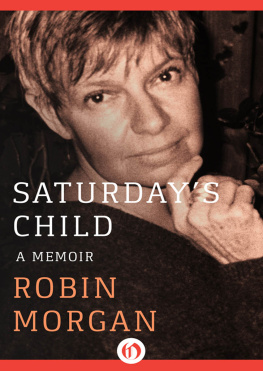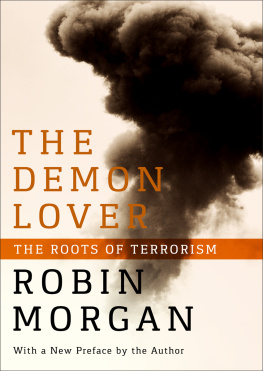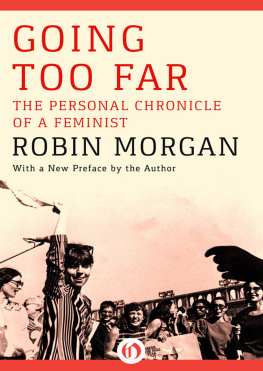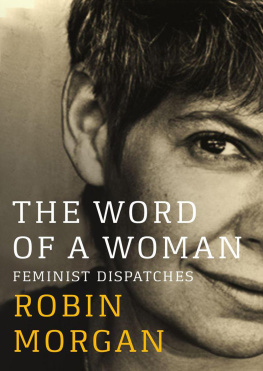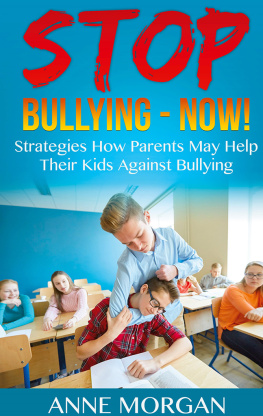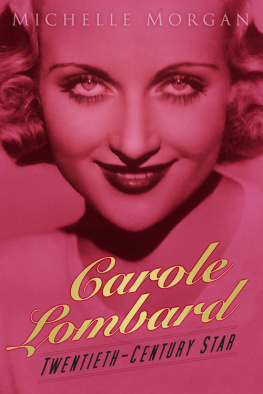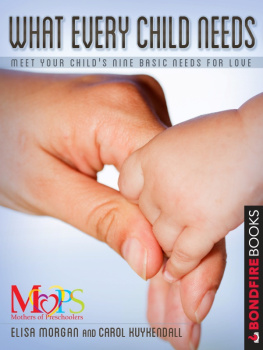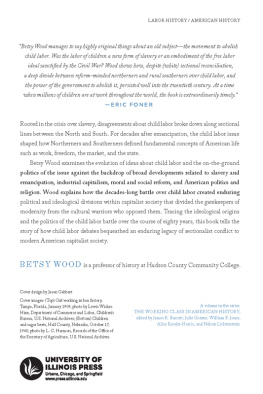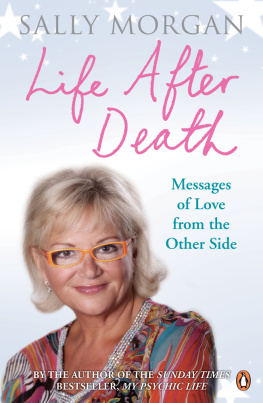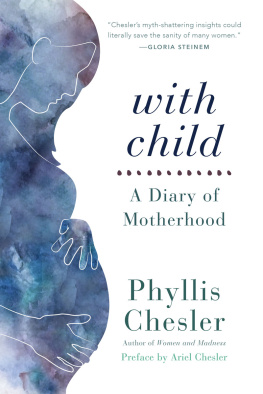Saturdays Child
A Memoir
Robin Morgan

ONE
Matrilineal Descent
Nothing ever wipes out childhood.
S lMONE DE B EAUVOIR
Every ancestry begins with the mother, but mine ends there, too.
I never met any of my grandparents. The maternal pair had emigrated from that permeable-membrane part of Eastern Europe that was one day Polish, another Russian, a third Prussian. My grandfather Reuben, for whom I was named, had been a rabbi in his village. According to family lore, he was a gentle, scholarly man with a sense of humor, an idealistic outlook, and a passion for softly scrambled eggs. However, his wife, Rose, was, according to all three of her daughters, a matriarch straight from the tales of the Brothers Grimm: fierce, strict, loud, a bully to her husband and children. She certainly looks formidable in the one picture I have of her and my grandfather: Reuben Teitlebaum, slouching, regards the camera with a slightly amused expression, just short of a smile, but Rose wears her frown like semaphore signaling a storm, and her posture is as rigid as the corset encasing her bulk.
Then again, she had reason to frown. Life had uprooted and disappointed her sorely. She had made a real catcha man of prestige, a rebbemarried him, and started a family, only to be hauled away from her village into a strange new world where he couldnt find a synagogue to hire him, so had to clerk in a hardware store. She, who was to have lived her life as a rebbitzen, a rabbis wife, the most respected woman in the village, became a nobodypoor, without prominence, burying three infants in childbirth and raising the two sons and three daughters who survived in an immigrant Jewish community based in, of all places, Atlanta, Georgia. He consoled himself with books, Carusos phonograph records, and scrambled eggs. She consoled herself with rage.
The sons, naturally, were the hope of the family. My memories of Uncle Aham and Uncle Samuel are so hazy they might as well be cut from gauze; I was barely a toddler the few times (Im told) I met them. By then my mother, Faith, was already in flight from what remained of her family, except for her two older sisters, Sally and Sophie.
These three women shared a lifelong bond: resentment. They co-cherished indignation as if it were a family heirloom, and their lives provided them with ample justification, as in the case of their brothers: the boys had been sent to college, but the two older daughters were flatly denied higher education, while my mother was permitted to sample it but was yanked out after one tantalizing year. My uncles and what families they eventually had accordingly vanished into a category that, had it been acknowledged, would have been labeled Dont-discuss-around-the-child-unless-absolutely-necessary-and-then-only-in-Yiddish.
Both aunts, on the other hand, were vivid presences throughout my childhood. Much as each of the three sisters considered herself unique, they all shared the same body type (short and overweight), and they all exhibited certain similar characteristics. Among these was an excessive reverence for perceived authority: bus drivers and waiters were addressed as Sirbut this was definitely not out of any courtesy or respect for the working class; in Georgia, they were working class, yet under my grandmothers tutelage they carried themselves instead as Daughters of a Rabbi. More likely, such obsequiousness was rooted in first-generation-immigrant anxiety, or further back, in the periodic pogroms that would terrorize their native village. In any event, whatever rebellious energy the sisters possessed they reserved for use at the kinship level, to be expressed through continual railing against existencein the guise of blood relatives.
They also shared a capacity for exaggeration that rocketed past puny art into stratospheric lie. No doctor could be merely good; to warrant confidence, he (and it was he then) had to be the top in his field, the best in the world, the medicine-magician sheiks journeyed from Arabia to see. (I kept trying to figure out why he chose to practice out of a two-room office in Yonkers.) A low- or mid-level theatrical agent or a would-be producer became the most powerful man in show business. Even a plastic necklace cleverly molded into fake coral spikelets was once vigorously defended as rare coral, imported direct from the Great Barrier Reef. Since the sisters own individual and collective histories were also prime subject matter for their exaggerative talent, they frequently reinvented themselves, their present, and their past. But they rarely did so in concert, which meant screaming matches over whose version was true. Sometimes I had a French great-grandmother named Yvonne who was wildly popular at the court of the tsarand sometimes I didnt; sometimes the family had a branch of great scholars among the Sephardic Jews back to the Middle Agesand sometimes it didnt. Consequently, I learned two lessons the hard way but early: that understatement was ineffective for making oneself heard at home, and that reality was decidedly relative. I grew up witnessing truth as the tennis ball in a match between Dionysus and Lao Tzu.
But however ectoplasmic facts may have been to these women, emotion was realutterly, suffocatingly real. All three of them Drama Queens of Ashkenazic Family Theater, my mother and aunts performed their lives in operatic fashion and at decibels aimed for the fifth balconys back rows. Each preferred arias, but they often went at it in duets, and their periodic trios were memorable.
The middle sister, Sophie, led the closest to what in those days was considered a normal life: she married (a distant cousin with the same surname, Teitlebaum), bore a son and a daughter, and seemed content to become an obsessive housekeeper and a wonderful cook. I can still remember the pungency of her cooking smells, their promise beckoning from far down the hall outside her apartment door: comforting chicken soups bobbing with kreplach, crisp noodle kgles, pot roasts with garlicky dumplingsand the heavenly, moist, almond-flour cakes she would bake in special molds the shape of lambs, then decorate with vanilla frosting and shaved-coconut curls, raisin eyes, and a maraschino-cherry mouth. Unfortunately, I also remember the yelling, tearful fights she waged with my cousins, her son Jerry and daughter Dorothy, both already teenagers when I hadnt yet started school. Jerry fled to enlist in the navy and was based at Pensacola, Florida (to my childs ear and logic, this became Pepsi Cola, Florida, named after a product as was Hershey, Pennsylvania, which I knew about since I had once appeared there in a fashion show). Dorothys revolt took the form of as many boyfriends as could be crammed into a given daya tendency that had persisted, until I lost track of her, through three marriages and three more live-in relationships.
Still, Aunt Sophie cossetted me, let me help with cutting out cookies and decorating the lambie cakes, told me stories, and, unlike Aunt Sally, seemed to care more about my schoolwork than about my fan clubs. Her husband, Uncle Harry, a retired semi-invalid with a colostomy, made me nervous: he rarely said anything while shuffling through their apartment en route from bedroom to bathroom and back. Sophie could also unnerve me on occasion, as when she enjoyed removing her false teeth and snapping them in my face or chasing me around with her vacuum cleaner, an upright with a roaring motor and a single light glaring from its forehead like a robotic cyclops. Scaring young children is considered by many adults to be an act of good-natured fun, but its always struck me as a sadistic display of grown-up power thinly disguised as teasing. The small-bodied peoplechildrenget the message on all levels, and learn to respond with manic laughter signaling not so much humor as submission.

